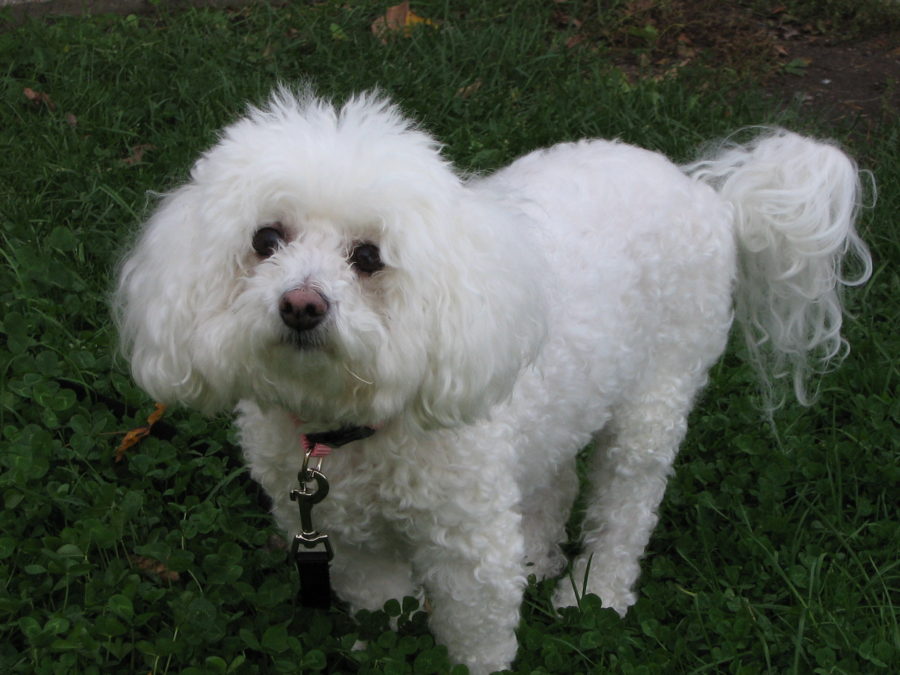When it comes to companion animals, the Bichon Frise has it all. Playful, curious, and upbeat, these non-sporting dogs are full of personality. Perhaps best known for their white, plush, velvety coat and round head with dark, large-set eyes, this breed is hypoallergenic. Their confidence and trainability nearly guarantee a smooth ride. This hardiness makes them excellent travel partners. However, these little pups don’t always take well to being left alone in unfamiliar situations, so in-cabin travel is strongly recommended. This could pose a problem for some of the largest variations of the breed. Still, it’s a problem worth overcoming: A Bichon Frise will charm most with their beauty, intelligence, and resiliency.

…HAVE EVERYTHING?
Size and Travel Options
The Bichon Frise will stand between 9.5-11.5 inches once fully grown. Dogs on the higher end of the height spectrum might have difficulty fitting into an airline-approved carrier, but investing in a roomy, collapsible, soft-sided carrier can provide additional comfort. Weight, however, could pose another issue. Most Bichon Frise adults weigh between 12-18 pounds, which is usually the maximum weight allowed by airlines. Purchasing a lightweight carrier can give you some flexibility, but it is essential to keep your dog’s size and weight in mind before buying an in-cabin ticket. We recommend checking your airline’s exact height and weight requirements. If your pup is too big, he will have to fly as checked-baggage or cargo.
Personality as a Travel Companion
If the right size and weight, a Bichon Frise is the perfect travel companion. Their intelligence makes them easy to train, and their general friendliness means they’re not likely to get spooked by loud noises on an airplane. If your dog does not fit the height and weight specifications your airline imposes, you should prepare for considerable crate training or consider alternative travel methods for your companion animal.
Before making a final decision on this breed, you should know that this breed has higher than average grooming and maintenance needs. In addition to daily or near daily brushing, most owners find it best to take their dog to the groomer every 4-6 weeks. They’re considered hypoallergenic because when they shed, the hair tends to get caught in the undercoat. This medium energy dog can bounce back and forth between long stretches of calm and bursts of energy. Daily walks and play sessions are recommended, but as long as the dog is given plenty of opportunity for exercise it should have no trouble curling up and watching a movie with you.
Health and Longevity
Most Bichon Frise dogs will live up to 15 years. The breed is relatively healthy, experiencing very few genetic health problems. Some will develop hip dysplasia, which occurs when a hip socket does not fully cover the ball portion of the upper thighbone. Animals with this genetic condition will likely have trouble standing for long periods of time, so allowing your dog the space to sit or lie down within their carrier is a must. These dogs can also experience early tooth loss or complications from gum infections if dental care is not a priority. Before boarding your plane, be sure to ask your veterinarian for hip, patella, and ophthalmologist evaluations to secure a clean bill of health.
Bichon Frise Breeders and Adoption Centers
If you want to ensure your dog can fly in-cabin, we recommend working with a breeder who can increase the chances that your puppy won’t outgrow itself as a travel companion. You can also search adoption centers for smaller adult dogs. The good news is that Bichon Frise is a relatively inexpensive dog. Adopting this dog from a shelter will generally cost around $300-$600, and purchasing a healthy puppy from a reputable breeder can cost anywhere between $700 to $2,500.